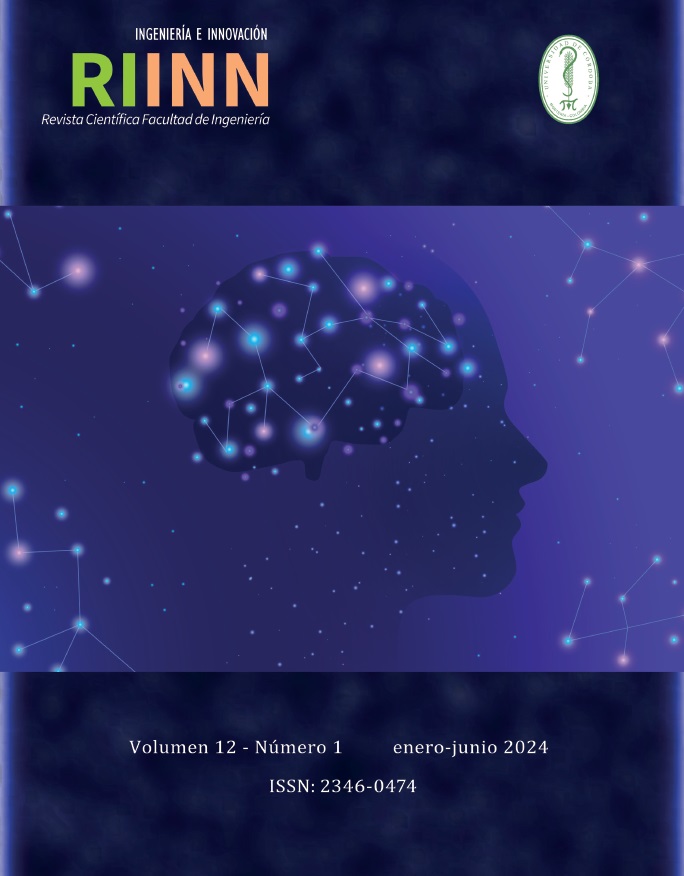El impacto de la inteligencia artificial en la educación universitaria
The Impact of artificial intelligence on university education
Mostrar biografía de los autores
La inteligencia artificial ha tenido un crecimiento exponencial durante los últimos años, tanto hasta llegar al punto en donde se interfiere en el campo
educativo, modificando la pedagogía empleada por los estudiantes a la hora de desarrollar sus actividades. El objetivo de este trabajo es analizar el
comportamiento ético y el buen uso de las nuevas tecnologías de inteligencia artificial dentro del campo universitario. Se realizó una investigación de
carácter cualitativo basado en 40 artículos de investigación en las diferentes bases de datos para así poder afianzar el conocimiento sobre el uso y el impacto de las Inteligencias Artificiales que se han convertido en algo indispensable como muchas tecnologías que en su tiempo fueron emergentes, con la conclusión de conocer antecedentes, recalcar los beneficios obre su uso en la educación superior y como aplicarla mediante diferentes aplicaciones recomendadas.
Visitas del artículo 248 | Visitas PDF
Descargas
- Abeliuk and Gutiérrez. (2021). Historia y evoluciónde la inteligencia artificial. Revista Bits de Ciencia, Volumen (21), pp. 14-21. https://revistasdex.uchile.cl/index.php/bits/issue/view/217
- AI and education: Guidance for policy-makers. (2021a). UNESCO. https://doi.org/10.54675/PCSP7350
- Atlas, S. (2023). ChatGPT for Higher Education and Professional Development: A Guide to Conversational AI.
- Bozkurt, A. (2023). Generative artificial intelligence (AI) powered conversational educational agents: The inevitable paradigm shift. Asian Journal of Distance Education, 18(1), 2023. https://doi.org/10.5281/zenodo.7716416
- Bozkurt, A. (2020). Educational Technology Research Patterns in the Realm of theD igital Knowledge Age. Journal of Interactive Media in Education, 2020(1), 18. https://doi.org/10.5334/jime.570
- Bozkurt, A., Xiao, J., Lambert, S., Pazurek, A., Crompton, H., Koseoglu, S., Farrow, R., Bond, M., Nerantzi, C., Honeychurch, S., Bali, M., Dron, J., Mir, K., Stewart, B., Costello, E., Mason, J., Stracke, C. M., Romero-Hall, E., Koutropoulos,A ., … Jandrić, P. (2023). Speculative Futures on ChatGPT and Generative Artificial Intelligence (AI): A Collective Reflection from the Educational Landscape. Asian Journal of Distance Education, 18(1), 53. http://www.asianjde.com/
- Carrasco, J. P., García, E., Sánchez, D. A., Porter, E., De La Puente, L., Navarro, J., & Cerame, A. (2023). ¿Es capaz “ChatGPT” de aprobar el examen MIR de 2022? Implicaciones de la inteligencia artificial en la educación médica en España. Revista Española de Educación Médica, 4(1). https://doi.org/10.6018/
- edumed.556511
- Celik, I. (2023). Towards Intelligent-TPACK: An empirical study on teachers’ professional knowledge to ethically integrate artificial intelligence (AI)-based tools into education. Computers in Human Behavior, 138. https://doi.org/10.1016/j.chb.2022.107468
- ChatGPT and Artificial Intelligence in higher education: Quick start guide. (2023). http://en.unesco. org/open-access/terms-use-ccbysa-en
- Chen, L., Chen, P., & Lin, Z. (2020). Artificial Intelligence in Education: A Review. IEEE Access,8, 75264–75278. https://doi.org/10.1109/ACCESS.
- 2988510
- Chiu, T. K. F., Xia, Q., Zhou, X., Chai, C. S., & Cheng, M. (2023). Systematic literature review on opportunities, challenges, and future research recommendations of artificial intelligence in education. In Computers and Education: Artificial Intelligence (Vol. 4). Elsevier B.V. https://doi.org/10.1016/j.caeai.2022.100118
- Coccoli, M., Guercio, A., Maresca, P., & Stanganelli, L. (2014). Smarter universities: A vision for the fast changing digital era. Journal of Visual Languages and Computing, 25(6), 1003–1011. https://doi.org/10.1016/j.jvlc.2014.09.007
- Cooper, G. (2023). Examining Science Education in ChatGPT: An Exploratory Study of Generative Artificial Intelligence. Journal of Science Education and Technology, 32(3), 444–452. https://doi.org/10.1007/s10956-023-10039-y
- De Córdoba, U. (1996). INTELIGENCIA ARTIFICIAL y SISTEMAS EXPERTOS.
- De Reflexión, A., & Aparicio-Gómez, W.-O. (2023). REVISTA INTERNACIONAL DE PEDAGOGÍA E INNOVACIÓN EDUCATIVA | Transformando el Aprendizaje para el Siglo XXI: Artificial Intelligence and itsI mpact on Education: Transforming Learning for the 21st Century. 2, 2023. https://orcid.org/0000-0002-8178-1253
- Dergaa, I., Chamari, K., Zmijewski, P., & Saad, H. Ben. (2023). From human writing to artificial intelligence generated text: Examining the prospects
- and potential threats of ChatGPT in academic writing. Biology of Sport, 40(2), 615– 622. https://doi.org/10.5114/BIOLSPORT.2023.125623
- Figaredo, D. D. (2020). Data-driven educational algorithms pedagogical framing. RIED-Revista Iberoamericana de Educación a Distancia, 23(2),
- –84. https://doi.org/10.5944/ried.23.2.26470
- Guerrero, D. (2021). Propuesta de un aula STEAM bajo el enfoque industria 4.0.
- Giró-Gracia, X., & Sancho-Gil, J. M. (2022). La Inteligencia Artificial en la educación: Big data, cajas negras y solucionismo tecnológico. Revista Latinoamericana de Tecnología Educativa - RELATEC, 21(1), 129–145. https://doi.org/10.17398/1695-288x.21.1.129
- González-González, C. S. (2023). El impacto de la inteligencia artificial en la educación: Transformación de la forma de enseñar y de aprender. Qurriculum.12 Revista de Teoría, Investigación y Práctica Educativa, 36, 51–60. https://doi.org/10.25145/j.qurricul.2023.36.03
- Hwang, G. J., & Tu, Y. F. (2021). Roles and research trends of artificial intelligence in mathematics education: A bibliometric mapping analysis and
- systematic review. In Mathematics (Vol. 9, Issue 6). MDPI AG. https://doi.org/10.3390/math9060584
- Gloria Kristine. (2020). Inteligencia Artificial en tiempos de pandemia.
- Javier Blázquez Ruiz, F. (2022). The Paradox of Transparency in AI: Opacity andE xplainability. Allocation of Responsibility. In Revista Internacional de Pensamiento Político-i Época (Vol. 17).
- Lim, W. M., Gunasekara, A., Pallant, J. L., Pallant, J. I., & Pechenkina, E. (2023). Generative AI and the future of education: Ragnarök or reformation? A paradoxicalp erspective from management educators. International Journal of Management Education, 21(2). https://doi.org/10.1016/j.ijme.2023.100790
- Miller, T. (2019). Explanation in artificial intelligence: Insights from the socials ciences. In Artificial Intelligence (Vol. 267, pp. 1–38). Elsevier B.V. https:// doi.org/10.1016/j.artint.2018.07.007
- Nguyen, A., Ngo, H. N., Hong, Y., Dang, B., & Nguyen, B. P. T. (2023). Ethicalp rinciples for artificial intelligence in education. Education and Information Technologies, 28(4), 4221–4241. https://doi.org/10.1007/s10639-022-11316-w
- Patricio Peñaherrera Acurio, W., Clemente Cunuhay Cuchipe, W., Judith Nata Castro, D., & Enrique Moreira Zamora, L. (2022). Implementación de la Inteligencia Artificial (IA) como Recurso Educativo. Implementation of Artificial Intelligence (AI) as anEducational Resource. https://doi.org/10.26820/recimundo/6.(2).abr.2022.402-413
- Puerto, D. A. Del, & Gutiérrez-Esteban, P. (2022). Artificial Intelligence as an Educational Resource during Preservice Teacher Training. RIED-Revista
- Iberoamericana de Educación a Distancia, 25(2), 347–362. https://doi.org/10.5944/ried.25.2.32332
- Qadir, J. (2023). Engineering education in the era of ChatGPT: Promise and pitfalls of generative AIfor education. https://doi.org/10.1109/EDUCON54358.2023.10125121
- Qadir, J., & Al-Fuqaha, A. (2020). A student primer on how to thrive in engineering education during and beyond COVID-19. Education Sciences, 10(9), 1–22. https://doi.org/10.3390/educsci10090236
- Qadir, J., Islam, M. Q., & Al-Fuqaha, A. (2022). Toward accountable human- centered AI: Rationale and promising directions. In Journal of Information,
- Communication and Ethics in Society (Vol. 20, Issue 2, pp. 329–342). Emerald Group Holdings Ltd. https://doi.org/10.1108/JICES-06-2021-0059
- Qadir, J., Taha, A. E. M., Alvin Yau, K. L., Ponciano, J., Hussain, S., Al-Fuqaha, A., & Imran, M. A. (2020). Leveraging the force of formative assessment & feedback for effective engineering education. ASEE Annual Conference and Exposition, Conference
- Proceedings, 2020-June. https://doi.org/10.18260/1-2-- 34923
- Recommendation on the ethics of artificial intelligence. (2021b). UNESCO.
- Reich, J., & Johnson, L. (2022). Failure to Disrupt: Why Technology Alone Can’t Transform Education. Journal of Teaching and Learning, 16(1). Harvard
- UniversityP ress. www.jtl.uwindsor.ca
- Rouhiainen, L. (2018). Inteligencia artificial: 101 cosas que debes saber hoy sobre nuestro futuro. Alienta.
- Sociedad, U. Y., Estupiñán Ricardo, J., Yelandi Leyva Vázquez, M., Javier Peñafiel Palacios, A., El Assafiri Ojeda, Y., Ricardo, E., Vázquez, L., Palacios, P., & Assafiri Ojeda, E. (2021). Volumen 13 | Número S3| Diciembre. 2021.
- Susnjak, T. (2022). ChatGPT: The End of Online Exam Integrity? http://arxiv.org/abs/2212.09292
- Vera, F. (2023). REVISTA ELECTRÓNICA TRANSFORMAR: Integración de laI nteligencia Artificial en la Educación Superior: Desafíos y Oportunidades. https://orcid.org/0000-0002-4326-1660
- Vera Rubio, P. E., Bonilla González, G. P., Quishpe Salcán, A. C., & Campos Yedra, H. M. (2023). Artificial intelligence in higher education: A transformative approach. Polo del Conocimiento: Revista científico - profesional, 8(11), 67-80.
- Viteri Alcivar, Y. A., Minaya Vera, C. G., Saltos Pinargote, D. E., & Cano Montesdeoca, M. T. (2021). Artificial intelligence and new technologies in times of pandemics. Universidad Ciencia y Tecnología, 25(110), 164–171. https://doi.org/10.47460/uct.v25i110.488
- Yilmaz, R., & Karaoglan Yilmaz, F. G. (2023). The effect of generative artificiali ntelligence (AI)-based tool use on students’ computational thinking
- skills, programming self-efficacy, and motivation. Computers and Education: ArtificialI ntelligence, 4. https://doi.org/10.1016/j.caeai.2023.100147





